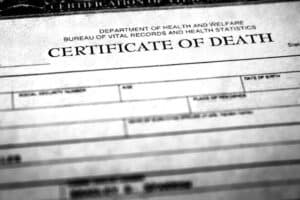Many laws and regulations must be followed when death occurs. For example, every crematory or funeral home in Pennsylvania and New Jersey has a cremation authorization process, which typically includes the official identification of the body, a certified copy of the death certificate, and an authorization document. The authorization ensures that cremation is the desired form of final disposition and that all parties understand and consent to the process.
Here’s what you need to understand about completing the Authorization to Cremate form from the Philadelphia Cremation Society.
Table of Contents
What You Need to Know About Cremation Authorization
In Pennsylvania and New Jersey, cremation requires an authorization process that includes official identification of the body, a certified death certificate, and a signed authorization form. This process ensures that cremation is the chosen method of disposition and that all legal requirements are met.
The legal next of kin has the right to authorize cremation, with a generally recognized order of decision-makers, starting with the spouse and moving down the family line. Legal documents or disputes may alter this order, potentially requiring multiple signatures or legal intervention.
In both states, cremation requires visual identification or a signed affidavit, a certified death certificate, and a cremation authorization form. Additional legal considerations include reviews by a medical examiner, waiting periods, and specific permits, particularly in cases of sudden or suspicious deaths.
Pre-planning cremation services can alleviate the burden on family members and prevent disputes.
Who Can Authorize Cremation?
The deceased’s legal next of kin has the right to authorize cremation in both Pennsylvania and New Jersey. Here’s the generally recognized order of decision-makers for cremation authorization:
- Spouse
- Children
- Parents
- Siblings
- Grandchildren
- Grandparents
- Other relatives
- Legal guardians or executives
- Court-appointed representative or authorizing agent
It’s important to note that specific circumstances or additional legal documents (such as a will or power of attorney) might influence the order of priority. Legal intervention may be necessary when there is a dispute or confusion over who has the right to authorize cremation.
It’s also important to note that both Pennsylvania and New Jersey may require multiple signatures from family members if there is a dispute or if no clear next of kin is identified.
Documents Required for Authorization
Both Pennsylvania and New Jersey require visual identification of the deceased or a signed affidavit confirming the identity before proceeding with the cremation process. In both states, a certified copy of the death certificate is also needed. Finally, the cremation authorization form must be completed, indicating consent for the cremation.
Legal and Ethical Considerations for Cremation
There are other laws and regulations that must be considered before cremation can occur.
Review by a medical examiner
In both Pennsylvania and New Jersey, if the death is sudden, suspicious, or due to unnatural causes, the medical examiner must review and approve the cremation.
Waiting period
Pennsylvania does not have a mandatory waiting period, but New Jersey requires a 24-hour waiting period before cremation can take place.
Other permits
Pennsylvania and New Jersey have specific laws governing the cremation process, including the need for a burial transit permit in New Jersey.
Other Considerations When Planning for the Cremation Process
It’s best when a person leaves behind instructions for their funeral service and final wishes. When a person pre-plans their own cremation services, they remove the burden of decision from their family members. There’s no guessing “what mom would have wanted.”
In addition, if family members disagree on cremation, it can delay the process. Legal mediation may be necessary to resolve such disputes; however, a 2018 Pennsylvania law made it easier for families with multiple children. Part of the right to disposition law allowed for majority rule among family members of the same tier to determine disposition without repercussions or having to petition the court. This means if your mom dies and your dad is already deceased, you don’t have to have the authorization of every one of your mother’s children to have her body cremated.
Who is authorized to receive the cremated remains is sometimes also contentious. That’s why the cremation authorization form in both states specifies how the ashes will be handled, such as being returned to the funeral director or a specific family member or interred in a non-recoverable grave. For this reason, you may have to show your ID when picking up your loved one’s cremains.
What Happens After the Authorization?
The cremation can proceed once authorization is granted and the waiting period has passed. Only one human body can be placed in the cremation chamber at a time. The actual cremation process takes three to four hours, with one or two additional hours for processing. (After cremation, the remains are processed into bone fragments (typically called ashes) and returned to the family or handled according to the instructions in the authorization form.
What You Need to Know About Philadelphia Cremation Society’s Authorization to Cremate Form
The Authorization to Cremate form is located on our website. This cremation permit is an authorization for cremation provided by the Philadelphia Cremation Society, allowing The Ivy Hill Cemetery Company to cremate the remains of a deceased person. The form requires the Authorizing Agent(s) (who must be over 18 and have legal authority) to certify the identification of the deceased and confirm that any potentially harmful medical devices have been removed. The form also outlines the options for the disposition of the cremated remains and limits the liability of the cemetery company. The Authorizing Agent(s) agree to indemnify the cemetery from any claims related to the cremation process. Finally, the Authorizing Agent(s) and the funeral director must sign the form to confirm their understanding and agreement.
What other questions do you have about authorizing cremation of your loved one? Our staff is happy to help answer any questions you have about cremation or complications that may be present to authorize cremation. Contact a member of the Philadelphia Cremation Society staff to learn more.





